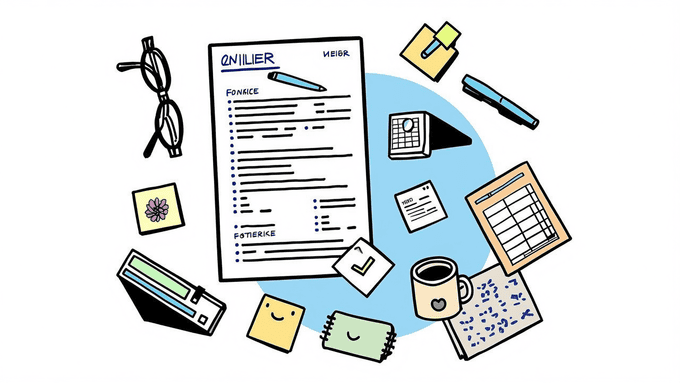Summary and Expanded Content in English Markdown Format

Overview of ChatGPT for Job Interview Preparation
ChatGPT is a powerful AI tool that revolutionizes job interview preparation by offering 24/7 access to a personal interview coach. It helps to gain confidence, refine responses, and increase the chances of landing a dream job. Here's how ChatGPT can be effectively used:
- Unlimited Practice: Rehearse interview scenarios as many times as needed.
- Customized Feedback: Obtain personalized suggestions for answer improvements.
- Current Industry Knowledge: Access up-to-date information and trends.
- Diverse Perspectives: Explore various ways to answer questions.
- Confidence Boost: Practice responses to increase confidence.
ChatGPT Prompts for Job Interview Preparation
-
Research the Company:
- Summarize the main products/services, mission, and recent news of [company name].
- What are the core values of [company name] and how do they reflect in their work?
- Explain [company name]'s position in the market compared to its main competitors.
- Describe the company culture at [company name] based on their public information and employee reviews.
-
Analyze the Role:
- What are the top five skills required for the job?
- What might be the biggest challenges in the role?
- Describe a typical day for the role at [Company Name].
- How has the role evolved, and what future trends are relevant?
-
Practice Staying Calm:
- Five quick relaxation techniques before an interview.
- Reframing nervousness into excitement.
- Actions to take if feeling overwhelmed during the interview.
- A ten-minute pre-interview routine for confidence and preparation.
-
Improve Your Body Language:
- Ideal body language from entering to leaving the room.
- Common body language mistakes to avoid.
- Effective use of hand gestures during an interview.
- Maintaining good eye contact without appearing uncomfortable.
-
Prepare for the Basics:
- Top ten common job interview questions and answers.
- Checklist of things to prepare the night before an interview.
- Structuring answers using the STAR method.
- Building rapport with the interviewer.
-
Anticipate Role-Specific Questions:
- Five technical questions for a [Job Title] interview.
- Demonstrating expertise in [specific skill] during the interview.
- Recent developments in [industry/field] to discuss.
- Examples of projects or achievements that would impress in a [Job Title] interview.
-
Practice Behavioral and Situational Questions:
- Three example answers to a challenge question.
- Responding to working with a difficult colleague.
- A framework for answering unexpected situational questions.
- Structuring an answer about a time of failure or mistake.
-
Prepare Your Answers in Advance:
- Creating a 90-second 'Tell me about yourself' response.
- Discussing weaknesses without undermining candidacy.
- Quantifying achievements for interview answers.
- Explaining career change compellingly.
-
Learn to Handle Tricky Questions:
- Responding to 'Why are you leaving your current job?'
- Handling the question 'What's your expected salary?'
- Addressing gaps in employment history.
- Structuring an answer for 'Why should we hire you over others?'
- Discussing weaknesses while showing strength as a candidate.
-
Consider Questions to Ask the Interviewer:
- Five insightful questions about company culture.
- Questions about growth opportunities in the role.
- Questions to understand the team you'd be working with.
- Phrasing a question about work-life balance.
-
Follow-Up After the Interview:
- Drafting a post-interview thank-you email template.
- Including content in a follow-up email after a week without response.
- Politely asking for feedback if not getting the job.
- Suggesting a LinkedIn message to stay connected after rejection.
Effective Use of ChatGPT
To maximize the benefits of ChatGPT for interview prep:
- Practice storytelling to structure experiences into narratives.
- Stay updated with industry trends to demonstrate knowledge.
- Tailor ChatGPT's advice to your target role by inputting the job description.
- Conduct mock interviews with ChatGPT for real-time practice.
- Refine answers by asking ChatGPT to review and provide feedback.
- Explore company culture to align your answers with company values.
- Prepare for follow-up questions predicted by ChatGPT.
- Develop a strong closing statement with ChatGPT's assistance.
FAQs About ChatGPT Prompts for Interview Prep
- Hiring Managers and ChatGPT: They cannot tell if you've used ChatGPT. Use it to understand concepts and gain confidence, not to memorize answers.
- Using ChatGPT for Interview Preparation: Use ChatGPT to research companies, generate interview questions, and practice with mock interviews. Tailor prompts to your situation for effective preparation.
- Mock Interviews with ChatGPT: ChatGPT can conduct mock interviews, focusing on behavioral, technical, or industry-specific questions. Complement ChatGPT practice with real mock interviews for well-rounded preparation.
Key Takeaways
- ChatGPT provides personalized, 24/7 interview preparation to help gain confidence and improve responses.
- Use ChatGPT for various aspects of interview prep, including research, analysis, practicing answers, and preparing questions for the interviewer.
- ChatGPT can simulate mock interviews for practice and feedback.
- Do not rely solely on ChatGPT; use it to enhance existing knowledge and communication skills, not to find ready-made answers.
- Be specific in your prompts, use follow-up questions, and tailor questions and responses to the role you're targeting for effective ChatGPT use in interview prep.